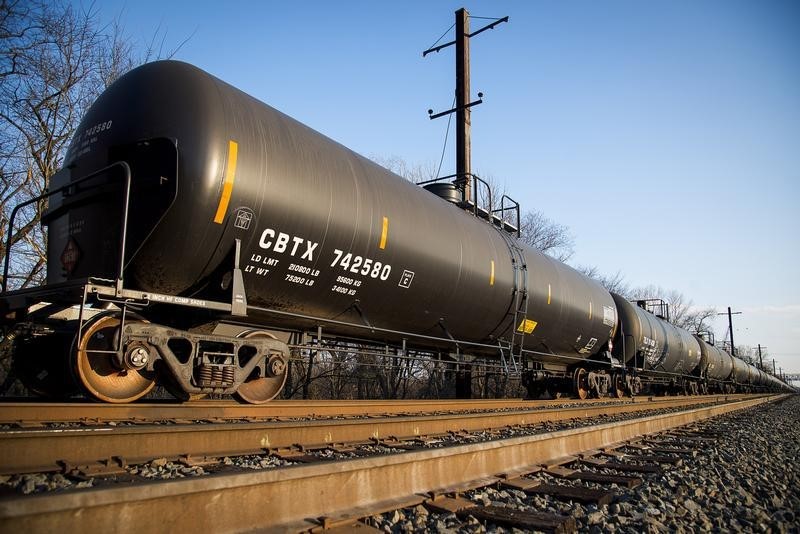By Roslan Khasawneh
SINGAPORE, Jan 31 (Reuters) - Oil prices jumped on Friday
following sharp losses this week, as the World Health
Organization (WHO) came out against travel and trade
restrictions in declaring a global emergency over the spread of
the coronavirus that originated in China last year.
Oil prices had fallen nearly 4% through Thursday this week -
hitting three-months lows - before rebounding on Friday, with
investors and traders worried over how the spreading virus would
impact demand for oil and its products.
"The WHO declared a global health emergency but more
importantly said travel and trade restrictions were not
necessary," said Edward Moya, senior market analyst at OANDA in
New York.
Brent crude futures LCOc1 jumped 90 cents to $59.19 a
barrel by 0243 GMT, after falling 2.5% the previous session.
Brent is still down 2.5% for the week.
U.S. West Texas Intermediate (WTI) futures CLc1 were up by
$1.03 to $53.17 a barrel. The contract fell 2.2% on Thursday and
is now 1.9% lower for the week.
The WHO on Thursday declared that the coronavirus outbreak
in China - which has killed more than 200 people there and has
spread to some 18 countries - now constitutes a public health
emergency of international concern.
Despite the WHO announcement and the rebound in prices on
Friday, analysts remained cautious and warned of further
downside risks if the virus continues to spread.
"Oil's January correction, a 13% drop to be exact, was ripe
for a bounce," said Moya.
"Oil is likely to remain vulnerable here despite today's
optimism that the coronavirus has likely been contained."
Italy's government decided to close all air traffic between
Italy and China, and airlines including Air France, American
Airlines and British Airways have stopped flying to Chinese
cities.
"We calculate that demand could be hit by 500,000 barrels
per day as China curbs outbound tourism, and international
carriers halt flights," said ANZ Bank in a note on Friday.
Prices were also buoyed by reports that Saudi Arabia has
opened a discussion about moving an upcoming output policy
meeting to early February from March following the recent slide
in oil prices.
- English (USA)
- English (UK)
- English (India)
- English (Canada)
- English (Australia)
- English (South Africa)
- English (Nigeria)
- Deutsch
- Español (España)
- Español (México)
- Français
- Italiano
- Nederlands
- Português (Portugal)
- Polski
- Português (Brasil)
- Русский
- Türkçe
- العربية
- Ελληνικά
- Svenska
- Suomi
- עברית
- 日本語
- 한국어
- 简体中文
- 繁體中文
- Bahasa Indonesia
- Bahasa Melayu
- ไทย
- Tiếng Việt
- हिंदी
Oil jumps as WHO declares emergency but recommends no travel, trade restrictions
Published 01/31/2020, 10:55 AM
Updated 01/31/2020, 10:56 AM
Oil jumps as WHO declares emergency but recommends no travel, trade restrictions

Latest comments
Install Our App
Risk Disclosure: Trading in financial instruments and/or cryptocurrencies involves high risks including the risk of losing some, or all, of your investment amount, and may not be suitable for all investors. Prices of cryptocurrencies are extremely volatile and may be affected by external factors such as financial, regulatory or political events. Trading on margin increases the financial risks.
Before deciding to trade in financial instrument or cryptocurrencies you should be fully informed of the risks and costs associated with trading the financial markets, carefully consider your investment objectives, level of experience, and risk appetite, and seek professional advice where needed.
Fusion Media would like to remind you that the data contained in this website is not necessarily real-time nor accurate. The data and prices on the website are not necessarily provided by any market or exchange, but may be provided by market makers, and so prices may not be accurate and may differ from the actual price at any given market, meaning prices are indicative and not appropriate for trading purposes. Fusion Media and any provider of the data contained in this website will not accept liability for any loss or damage as a result of your trading, or your reliance on the information contained within this website.
It is prohibited to use, store, reproduce, display, modify, transmit or distribute the data contained in this website without the explicit prior written permission of Fusion Media and/or the data provider. All intellectual property rights are reserved by the providers and/or the exchange providing the data contained in this website.
Fusion Media may be compensated by the advertisers that appear on the website, based on your interaction with the advertisements or advertisers.
Before deciding to trade in financial instrument or cryptocurrencies you should be fully informed of the risks and costs associated with trading the financial markets, carefully consider your investment objectives, level of experience, and risk appetite, and seek professional advice where needed.
Fusion Media would like to remind you that the data contained in this website is not necessarily real-time nor accurate. The data and prices on the website are not necessarily provided by any market or exchange, but may be provided by market makers, and so prices may not be accurate and may differ from the actual price at any given market, meaning prices are indicative and not appropriate for trading purposes. Fusion Media and any provider of the data contained in this website will not accept liability for any loss or damage as a result of your trading, or your reliance on the information contained within this website.
It is prohibited to use, store, reproduce, display, modify, transmit or distribute the data contained in this website without the explicit prior written permission of Fusion Media and/or the data provider. All intellectual property rights are reserved by the providers and/or the exchange providing the data contained in this website.
Fusion Media may be compensated by the advertisers that appear on the website, based on your interaction with the advertisements or advertisers.
© 2007-2024 - Fusion Media Limited. All Rights Reserved.